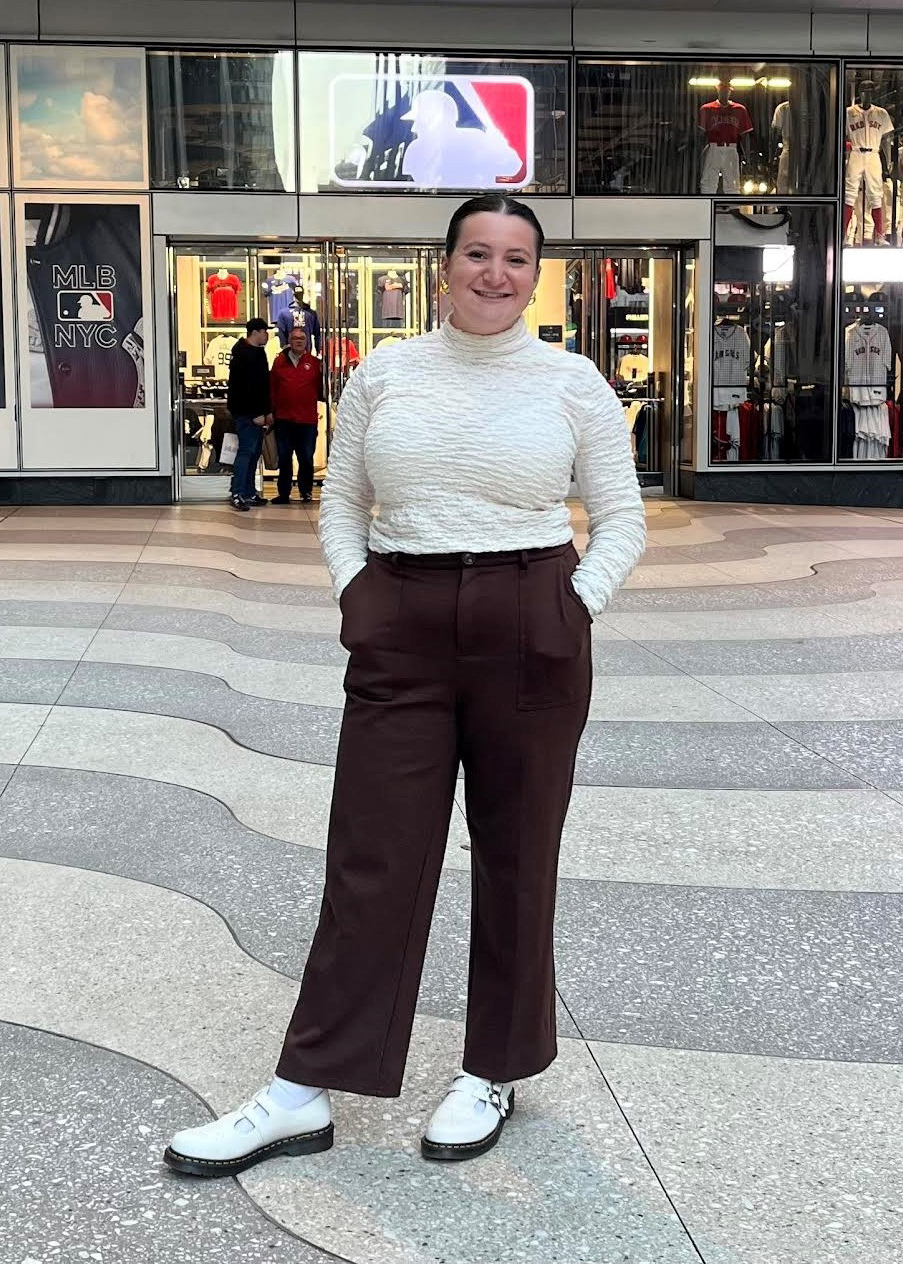After years of supporting her home state Atlanta Braves, Samantha Moss ’23 is aligning herself this Opening Day with a different team that often wears navy blue.
“I’m Team Umpire, 100%,” Moss said.
It might seem unusual for a fan to say that, but the Kalamazoo College alumna has a new job working for Major League Baseball: Moss, a timing operations administrator, is at MLB headquarters in New York, where she’s ready to assist on-the-field officials who need help interpreting the league’s new rules, especially those related to pitch clocks.
Starting last year, pitchers had 15 seconds to throw a pitch with the bases empty and 20 seconds with a runner on base. If a pitcher hadn’t started his delivery toward home plate before the pitch clock expired, he was charged with a ball. Plus, hitters needed to be in the batter’s box with eight seconds left on a pitch clock. If a batter delayed entering the box, he was charged with a strike.
Those rules were among several that helped drastically reduce the time it took to play a game from slightly more than three hours in 2022 to less than two and a half hours in 2023. This year, MLB has tweaked those rules in an effort to further speed up games. For example, a pitcher will have 18 seconds instead of 20 with runners on base to deliver his pitch this year. The league also is:
- Decreasing the number of pitching mound visits a team is allowed each game to four in the first through eighth innings with an additional visit permitted in the ninth inning.
- Adjusting when a pitch clock will reset after a dead ball situation such as a foul ball. Instead of waiting for a pitcher to retake the mound, the clock will restart as soon as the pitcher receives the ball.
- Requiring any pitcher who warms up on the field to face at least one hitter. In the past, a manager commonly would remove his pitcher before a pitch was thrown if their opponent brought in a pinch hitter to gain an advantage in a lefty-versus-righty match-up.
The changes require trained people such as Moss, a former K softball player and economics and Spanish double major who knows baseball well, to provide administrative support when questions related to specific situations arise.
“Similar to the people in Replay, we’re watching all the games at once and waiting for pitch clock violations,” Moss said. “When they do happen, we’re acting on it, sending what we need to send to the right people to ensure the rules are followed precisely. We need to make sure we know the rules in and out and relay those rules to the umpires and the people who control the pitch clock during the games. It’s a well-oiled system for it only being in its first year. We’re there for when a problem arises during the game or if the umpires need to clarify a rule. If we’re noticing things happening on the field, we’re a different perspective to help out.”


Moss first connected with MLB when she asked K baseball coach Mike Ott whether he knew anyone who works in the league. As luck would have it, Ott knows Jack Clark ’17, a K trustee and former Hornets baseball team captain, who started working with MLB in Replay Operations and now is its manager of draft operations. Thanks in part to Clark and a lot of continued networking, Moss attended baseball’s Winter Meetings last year and one of its events, Take the Field, a women-led conference.
“I always had an idea that I wanted to work in baseball when I started applying for jobs last year, but I wanted to be realistic, too,” Moss said. “I thought getting a corporate job is what I was supposed to do after I graduated from college. That conference was a game-changer for me. I got advice from women who are succeeding in the industry, and it opened my eyes to some possibilities I hadn’t considered before. I mark that as a pivot point in my career goals.”
Over the past year, Moss has coached and played softball in Sweden, worked in Grand Rapids and lived in Atlanta for a time while applying to about 90 baseball jobs. MLB, though, came along just in time for the season, and just two weeks after the call, Moss moved to New York.
“This just had to be what I did,” Moss said. “It’s one of those things where you say ‘yes’ and figure out the details for making it happen later.”
The full-time job is seasonal, although Moss is thrilled to be working in the sport and can’t wait to find out where her position might lead.
“I’m excited to be in the building with a lot of important baseball executives,” Moss said. “I feel like it’s a great place to network and see what opportunities there are around the league with MLB and with the individual teams. Baseball is a very fluid environment in terms of people’s positions and people are constantly moving in and out, up and down and all over. I don’t know what’s going to happen in the next year. I just know that I want to work in baseball. At the conference, somebody said, ‘Any job in baseball is a good job in baseball.’ And that’s so right. I’ll just trust my ability to make decisions this year and follow my gut in my career.”

